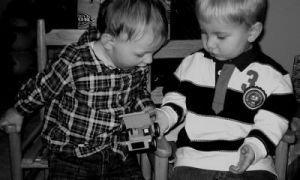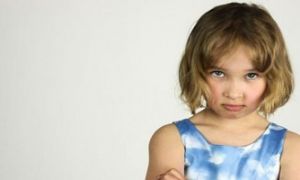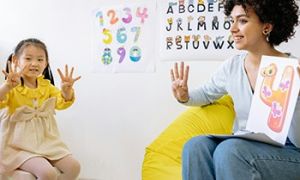

To make the Early Years Learning Framework (EYLF) planning cycle more impactful and engaging, you can explore strategies that emphasize collaboration, creativity, and responsiveness. The folowing article provides Strategies For An Impactful and Meaningful EYLF Planning Cycle, What Is Child Centered Focus, What is Continuous Documentation, What Is Dynamic Programming, How To Include Follow Ups Into The EYLF Program, How Often Children Should Be Observed and more.
EYLF Outcome 2 focuses on children being connected with and contributing to their world. It emphasizes fostering a sense of belonging, respect for diversity, and social responsibility. The following article provides information on the Definition Of Sub Outcomes, Practical Examples Of Sub Outcomes, Applying Sub Outcomes InTo Practice and more.
EYLF Outcome 1 focuses on children developing a strong sense of identity. It emphasizes the importance of children feeling safe, secure, and supported, which helps them grow in confidence to explore and learn. The following article provides information on the Definition Of Sub Outcomes, Practical Examples Of Sub Outcomes, Applying Sub Outcomes InTo Practice and more.
Here’s a step-by-step guide to programming and planning using EYLF. This guide also includes: How Do You Gather Information About Children's Interests, Strengths, and Learning Styles?, How Do You Analyze Observations To Identify Learning Outcomes?, How Do You Analyze Observations To Plan And Implement Further Learning Opportunities?, What Other Evidence Can Be Gathered To Intergrate Learning Opportunities Onto The EYLF Program and more.
The following article lists 30 art and craft descriptions and links to the EYLF. These can be used as a blurb, during observations, used for portfolios, or when displaying children's art and craft work.
Creating an Early Years Learning Framework (EYLF) curriculum plan involves several key steps to ensure it aligns with the framework’s principles and supports children’s learning and development. The following article provides a step by step guide on writing the EYLF curriculum plan.
Developmental milestones are things that, by a given age, most kids can accomplish. Milestones are reached by children in their play, learning, speaking, acting, and moving. The following article provides Developmental Milestones 2 - 3 Years Old with Examples Of Links To The EYLF.
Having a solid grasp of developmental stages will help you evaluate children's play and learning effectively. Sound professional knowledge should serve as the foundation for intentional teaching, planning, and evaluation. The following article provides Developmental Milestones 1 - 2 Years Old with Examples Of Links To The EYLF.
From today, 01 February 2024, both EYLF 2.0 and MTOP 2.0 will now come into effect and services will have to implement the new updated frameworks.
The Early Years Learning Framework recognizes the inextricable links that belonging, being and becoming have with learning. As part of this recognition, the framework elaborates learning outcomes, principles and practices for educators that will help them meet their professional goals while ensuring personal growth and well-being too. The following article provides definitions of belonging, being and becoming.
 Toddlers have a greater understanding of the world around them by this stage. Their cognitive development (also known as intellectual development and thinking skills) continues… Read More
Toddlers have a greater understanding of the world around them by this stage. Their cognitive development (also known as intellectual development and thinking skills) continues… Read More
 Infants begin to develop trust when parents begin to fulfil their needs. Such as changing an infant's nappy when needed, feeding on request and holding… Read More
Infants begin to develop trust when parents begin to fulfil their needs. Such as changing an infant's nappy when needed, feeding on request and holding… Read More
 Beginning at birth the construction of thought processes, such as memory, problem solving, exploration of objects etc, is an important part of an infant’s cognitive… Read More
Beginning at birth the construction of thought processes, such as memory, problem solving, exploration of objects etc, is an important part of an infant’s cognitive… Read More
 Toddlers want to do more on their own and do not like it when you begin to establish limits on their behaviour. Tantrums can become… Read More
Toddlers want to do more on their own and do not like it when you begin to establish limits on their behaviour. Tantrums can become… Read More
 Your preschooler is now able to focus their attention more accurately and is less influenced by distractions. The intensity of questions increase as your child… Read More
Your preschooler is now able to focus their attention more accurately and is less influenced by distractions. The intensity of questions increase as your child… Read More
 John Dewey is often seen as the proponent of learning by doing – rather than learning by passively receiving. He believed that each child was active,… Read More
John Dewey is often seen as the proponent of learning by doing – rather than learning by passively receiving. He believed that each child was active,… Read More
 Toddler advance and gains new skills in Gross Motor Development milestones achieved throughout earlier years. Co-ordination and challenges that could not be performed before such… Read More
Toddler advance and gains new skills in Gross Motor Development milestones achieved throughout earlier years. Co-ordination and challenges that could not be performed before such… Read More
 Erik Erikson developed a psychosocial theory to understand how we each develop our identities through eight stages of psychosocial development from infancy to adulthood. The… Read More
Erik Erikson developed a psychosocial theory to understand how we each develop our identities through eight stages of psychosocial development from infancy to adulthood. The… Read More
 At this point preschoolers begin to interact effectively with others. Play becomes more innovative and organized and “boyfriend” or “girlfriend” begins to emerge. Preschoolers have… Read More
At this point preschoolers begin to interact effectively with others. Play becomes more innovative and organized and “boyfriend” or “girlfriend” begins to emerge. Preschoolers have… Read More
 From now, babies begin to identify and respond to their own feelings, understanding other's feelings & needs and interact positively with others. A baby's social and… Read More
From now, babies begin to identify and respond to their own feelings, understanding other's feelings & needs and interact positively with others. A baby's social and… Read More

Toddlers want to do more on their own and do not like it when you...
See more...
Redirection is among the most effective proactive behaviour guidance methods in young children. It consists...
See more...
Preparing children for the leap into formal schooling involves more than academic knowledge—it means supporting...
See more...© 2009-2025 Aussie Childcare Network Pty Ltd. All Rights Reserved.

